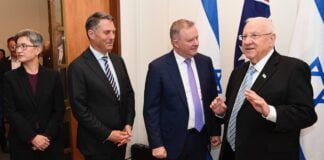The Labor leadership contest between Bill Shorten and Anthony Albanese has been put forward as a major step that can rejuvenate the Labor Party and give Labor members a real say in the party. But this will be meaningless without policy changes to shift Labor to the left and abandon its legacy of neo-liberal policies and efforts to race the Liberals to the right.
For the first time in a number of years, a representative of the left faction, Albanese, is standing for the leadership. Shorten has been anointed as the candidate of the right faction.
If Albanese is defeated, it will re-establish the right-wing control of the party. If he should win, nothing will change—the rank and file will still have no say in party policy and Labor will continue on a neo-liberal trajectory.
 Left and Right?
Left and Right?
Once upon a time, the fight between Shorten and Albanese would have been a fight between left and right policy platforms. Today, the left could be arguing to tax big business through increasing the mining tax, reversing the cuts to universities and single parents payments, increasing the level of Newstart welfare payments, restoring union rights, ditching the “PNG solution” and ending offshore processing of asylum seekers on Manus Island and Nauru, as well as closing US bases.
Any chance of reconnecting Labor with its working class base also requires getting to grips with the failure of the last six years of Labor government. Labor’s record low primary vote at the election, the lowest since the Second World War, cannot simply be blamed on in-fighting over the leadership between Gillard and Rudd.
There is a strong desire for the kind of social democratic policies that Labor once advocated, seen in every major survey of public opinion. Recent Essential polling shows over 60 per cent think big business, mining companies and the rich should pay more tax. There is also strong support for more spending on services like health and eduction. But Labor has squandered this mood for change by continuing the neo-liberal policies begun under the Hawke and Keating governments, through cutbacks in search of a budget surplus and the cave-in to business over the mining tax.
Labor under Rudd and Gillard delivered little that working class people could see to improve their lives. The big ticket items talked up before the election, the Gonski schools spending and the disability insurance scheme, were still just promises for the future after six years in government.
But far from any contest over policy, overwhelmingly the leadership race will be fought be over personalities.
There has been a long process of decline, but over the last six years of Labor government, the policy differences between Left and Right have all but collapsed, leaving the factions as largely concerned simply with dividing power and careers inside the party. This was obvious in recent parliamentary leadership ballots where the “Left” fractured, some siding with Gillard and some with Rudd.
Albanese has already asserted that there are no policy differences between him and Shorten; it is just that Albanese has more experience. Albanese listed four key points to show what he stand for in his initial pitch for the leadership—a strong economy in order to deliver jobs, investing in opportunities like education and training, tackling climate change and ensuring a sustainable Australia, and a fair go for all through combating discrimination. These are the same kind of meaningless slogans that Rudd put forward. Albanese couldn’t even explicitly commit himself to same-sex marriage.
And Shorten just says he is for “party, policy and people”.
The NSW right is promoting Shorten simply as the best candidate to “break with the past”, while prominent Albanese supporters are selling him on the basis of being raised by a single parent on a disability pension.
Party reform
The problem in Labor is not that the rank and file does not have a say in electing the parliamentary leadership. It is that the leadership does not actually represent the views of the rank and file (or Labor voters for that matter). The Parliamentary leadership is free to ignore party policy decisions and rank and file members have little say over policy in any case.
The democracy of the new leadership ballot is extremely limited—the vote of 53 politicians will be equal to the 40,000 votes of the rank and file—the kind of democracy that Joh Bjelke-Petersen would be proud of.
But the thrust of the organisational reform proposals put forward by people like Kevin Rudd and Chris Bowen are about breaking Labor’s historic link with the trade unions and entrenching the party’s right-wing direction. They want to implement a version of Third Way politics and take Labor further away from any effort to represent working class interests.
Since the major factions inside Labor all rely on trade union backing, this is what weakening factional control effectively means. But the left unions in particular will be crucial to any fight over policy change. In 2008 the unions united with rank-and-file Labor members to secure an overwhelming vote against power privatisation at the NSW Labor conference.
It is the unions’ institutional weight inside the party, their closer proximity to rank and file workers and their willingness to fight over their influence in the party that have historically been important for shifting Labor.
A fight against the party’s right-wing policy direction is what Labor really needs. Without this, in the longer run any effort at “party reform” will simply cement rank and file disillusionment with a party that is unable to halt its political decline.





